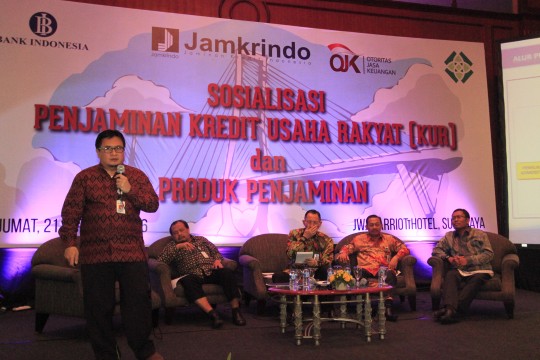SURABAYA I In order to successfully implement Law No. 1 of 2016 on Guarantees, Perum Jamkrindo held a socialization event on the Guarantee of People's Business Credit (KUR) and Guarantee Products to support the Government's program and assist Micro, Small, and Medium Enterprises (MSMEs) as well as the Warehouse Receipt System (SRG) Guarantee.
The socialization event was attended by the President Director of Perum Jamkrindo, Diding S. Anwar, Deputy and Deputy for Macroeconomic Coordination and Finance at the Coordinating Ministry for Economic Affairs of the Republic of Indonesia, Bobby Hamzar Rafinus, and the Director of Special Financial Institution Supervision at the Financial Services Authority, Irfan Sitanggang.
Additionally, panel discussion speakers included the Assistant Deputy for Capital Markets and Financial Institutions at the Coordinating Ministry for Economic Affairs, A. Heri Susanto, Head of Regional Office VI Surabaya Perum Jamkrindo, Untung Heri Sukariyanto, Head of Suretyship Business and Non-Bank Guarantee Division at Perum Jamkrindo, Amin Mas’udi, and Head of Warehouse Receipt System Guarantee Division, Soegeng Iman Wicaksono.
Diding stated that Perum Jamkrindo is the only state-owned enterprise (SOE) providing credit guarantees in Indonesia that also acts as a guarantor for KUR. "We are committed to empowering MSMEs across Indonesia. Jamkrindo is ready to accommodate micro, small, and medium business credit requests," said Diding at the KUR and SRG socialization event in Surabaya on Friday (21/11/2016).
Furthermore, Diding explained that the provision of KUR guarantees is necessary to assist productive and eligible MSMEs that are not yet bankable (do not meet the credit/financing requirements of banks) to access credit/financing from banks or other financial institutions. Additionally, this aims to enhance the competitiveness of MSMEs, enabling them to grow into sustainable businesses on a larger scale.
"With KUR, the development of the real sector and the empowerment of MSMEs will be accelerated. Therefore, it is essential to increase access to financing and develop MSMEs through financial institutions to alleviate poverty and expand job opportunities," he said.
Currently, the realization of KUR Guarantee Volume for the period of January 1 to September 30, 2016, shows that the KUR volume in September 2016 reached 34.1 trillion, achieving 68.37% of the 50 trillion target, while the KUR IJP in the same period was 1.01 trillion, reaching 76.69% of the 1.3 trillion target.
To support MSME development, Perum Jamkrindo has provided various guarantee products, including: General Credit Guarantee, Construction Credit Guarantee and Procurement of Goods and Services Guarantee, Micro Credit Guarantee, Invoice Financing Guarantee, Multipurpose Credit Guarantee, Goods Distribution Guarantee, People's Business Credit (KUR) Guarantee, Surety Bond Guarantee, FLPP Housing Loan Guarantee, Custom Bond Guarantee, Rural Bank (BPR) or Sharia Rural Bank (BPRS) Credit Guarantee, Cargo Agency Guarantee, Bank Guarantee, and Sharia Counter Guarantee.
For KUR guarantees, Perum Jamkrindo has collaborated with three state-owned banks, with a total volume of Rp33.9 trillion, namely Bank Rakyat Indonesia, Bank Mandiri, and Bank Negara Indonesia. Meanwhile, the total for private banks is Rp61 billion, and the total for regional development banks is Rp180.3 million.
In addition to being a KUR guarantor, as mandated by Government Regulation No. 1 of 2016, Perum Jamkrindo has also been assigned as the Implementing Institution for the Warehouse Receipt System Guarantee (LPP-SRG) to maintain commodity price stability. Its role is to guarantee the risk of loss due to potential failure of warehouse operators in fulfilling their obligations to return stored goods as stated in the Warehouse Receipt System (SRG).
SRG guarantees are categorized as program guarantees, similar to the People's Business Credit (KUR) and Housing Finance Liquidity Facility (FLPP) programs, where this business process is also a government program. Jamkrindo's current priority is to implement SRG guarantees as soon as possible after receiving the PMN.
The commodities that can be stored by warehouse operators under the SRG implementation include rattan, paddy, gambir, rice, tea, corn, rubber, seaweed, coffee, cocoa, tin, pepper, copra, and salt.



